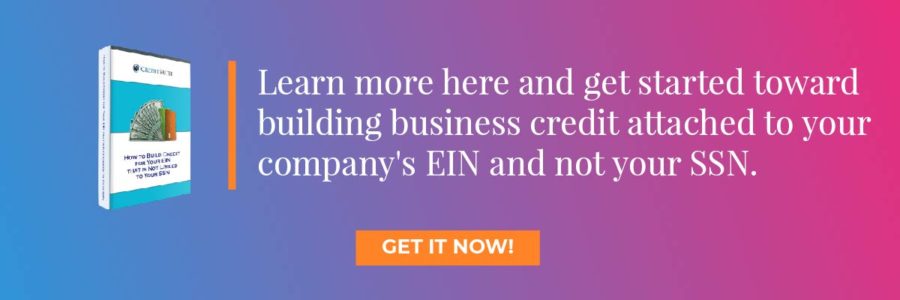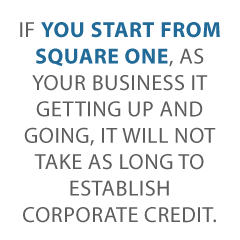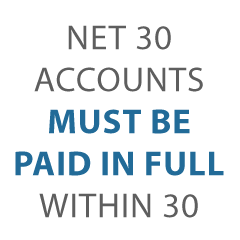
How Long Does It Take to Establish Corporate Credit? Not as Long as You May Think
Finally! The Answer to “How Long Does It Take to Establish Corporate Credit?”
How long does it take to establish corporate credit?
The quick and dirty answer is, not long. In fact, in just a few steps you can have a business credit profile ready to receive all your business account information and grow your business credit score.
However, often what people really mean when they ask the question “How long does it take to establish corporate credit?”is “How long does it take to build corporate credit?” The answer to that question is quite different. The process for establishing corporate credit initially is multi-step, but it doesn’t take all that long. In contrast, the process for building corporate credit doesn’t have as many steps, but it can take substantially longer. That is why it is important to start as soon as possible.
How Long Does It Take to Establish Corporate Credit from the Beginning?
If you start from square one, as your business it getting up and going, it will not take as long to establish corporate credit. That’s because there won’t be anything to undo. The goal is to make your business appear fundable to lenders as an entity separate from yourself. It can be done at any point. However, it is much easier and faster if you just start the process in the beginning. What’s the process?
How to Establish Corporate Credit
Establishing small business credit is a process. It is something that has to happen intentionally. It does not happen passively in the same way personal credit does. Once you have your business set up the right way however, the whole thing can happen pretty quickly.
You absolutely have to complete the steps in the right order. Not doing so will result in repeated denials. No one wants that.
Learn more here and get started toward building business credit attached to your company’s EIN and not your SSN.
How Long Does it Take to Establish Corporate Credit: Set Up Separate Contact Information for Your Business
Your business address, telephone number, fax number, and email address should all be separate from your personal ones. Ensure your number is from a toll-free exchange and that it has a 411 listing. You can take care of that here: http://www.listyourself.net.
Take note that your email address should not be through a free service such as Yahoo or Gmail. Rather, it should have the same URL as your company website. Can you guess the next point? You need a professional website with paid hosting through a service such as GoDaddy. These days, if you don’t have a website you may as well not exist. If you have a bad website, it’s even worse. Just get it done right from the beginning.
In truth, when it comes to “How long does it take to establish corporate credit?”, the answer is however long it takes to get your website built professionally. The rest of the steps can be completed while that is going on. Then, when your website is operational, you should have an established file and be ready to start building your business credit score.
How Long Does It Take to Establish Corporate Credit: Incorporate Your Business
The first thing you have to do after you have separate contact information is formally incorporate your business. The reason you need the contact information first is so that you can use it during the incorporation process.
Why incorporate? If you are organized as a sole proprietorship or partnership, all business transactions are just going to hit your personal credit. That is because there is no legal separation between you and your business. You are personally liable for all business debts.
You need to organize as a corporation, S-corp, or LLC. Which one you choose will depend on the level of liability protection you need and how much you want to spend. Any of them will serve the purpose of separating your business from you for the purpose of establishing business credit.
How Long Does it Take to Establish Corporate Credit: Get the Digits
Next, there are two important identifying numbers you need to apply for. The first is an EIN. This is a number for your business similar to you personal SSN. You can get one for free through the IRS website.
Next, you will need a D-U-N-S number. This is also free, and you get it on the Dun & Bradstreet website. You cannot have a credit file at Dun & Bradstreet without a D-U-N-S number. Since they are the largest and most commonly used corporate credit reporting agency, you definitely need a D-U-N-S number.
How Long Does it Take to Establish Corporate Credit: Dedicated Bank Account
You also need a dedicated corporate bank account that you use only for business transactions. This helps separate your business from yourself. Not only that, it will also help keep business and personal expenses separate for tax purposes.
All of these steps can happen pretty fast. Incorporation takes a little time, as does building a website. However, if you do it all on the front end you can speed the process along. If you are taking these steps after your business is already up and running, it could slow things down a bit.
How Long Does It Take to Establish Corporate Credit, or How Long Does It Take to Build Corporate Credit?
The next steps in the process are geared toward building your corporate credit after your credit file is open. The thing is, you have to get corporate accounts reporting to the corporate credit reporting agencies for your credit score to start building. This can be tricky, as most lenders consider no credit to be equal to bad credit. In the beginning of course, you have no credit.
If you do have credit already, but it’s bad, these steps can help improve it. However, it will take longer. It is always faster to build from zero rather than from a negative number.
How Long Does It Take to Build Corporate Credit? Not as Long as It Would Without the Vendor Credit Tier
First you need to build trade lines that will report payments. This is also referred to as the vendor credit tier. These vendors will extend net 30 terms on invoices without a credit check. Then they report your payments to the credit reporting agencies. This is how you get initial accounts reporting positive payment history.
Learn more here and get started toward building business credit attached to your company’s EIN and not your SSN.
Not all vendors are in the vendor credit tier. Of those that are, there are a select few that are easier to get started with. They can be used as stepping stones to gain more trade lines and thus, build your credit faster. Here are a few of those easiest to get started with.
Uline
Uline is online at www.uline.com. They sell shipping, packing, and industrial supplies. They report to D&B.
You have to have a D-U-N-S number. They ask for 2 references and a bank reference. The initial few orders may have to be prepaid to initially get approval for Net 30 terms.
Quill
Quill is another starter vendor. You can find them online at www.quill.com. They sell office, packaging, and cleaning supplies. They also report to D&B as well as Experian.
Because Quill reports to two separate credit reporting agencies, you get two credit experiences with them. Place an initial order first unless the D&B score is already established.
Typically, they put you on a 90-day prepayment schedule. If you order items each month for 3 months, they commonly approve you for a Net 30 Account.
Grainger Industrial Supply
Grainger Industrial Supply is online at www.grainger.com. They sell safety equipment, plumbing supplies, and more. They report to D&B. You must have a business license, EIN, and a D-U-N-S number.
For under a $1000 credit limit they approve almost anybody with a business license.
How Long Does it Take to Establish Corporate Credit: A Tip for Going Even Faster
One way to speed up the process is to ask vendors that you already work with if they will extend credit and report your payments. This could even include utilities, rent payments, and telephone companies. Internet providers are another option. Since you are already making payments, you could instantly have several accounts reporting positive payment history without taking on any new debt.
Remember they are not required to report payments, but some will if asked.
After you have enough accounts reporting, its time to move on to the next credit tier.
Retail Credit Tier
Once there are 5 to 8 or more vendor trade accounts reporting to at least one of the CRAs, then you can apply for accounts in the retail credit tier. These are service providers which include Office Depot and Staples.
Fleet Credit Tier
Once there are enough accounts reporting from the retail credit tier you can begin to apply for accounts in the fleet credit tier. These are companies such as BP and Conoco. Use this credit to buy fuel, as well as to repair and maintain vehicles.
Cash Credit Tier
The next tier, the cash credit tier, is the goal. One you have enough accounts reporting from the fleet credit tier, you can move on up to the cash credit tier. These are businesses such as Visa and MasterCard.
When applying for cards in any tier, only use your SSN and date of birth for verification purposes. For credit checks and guarantees, use your EIN instead.
How Long Does It Take to Establish Corporate Credit? Credit Monitoring
Know what is happening with your credit. Make certain it is being reported and take care of any errors as soon as possible. Get in the practice of taking a look at credit reports regularly.
We can help you monitor business credit at Experian and D&B for only $24/month. See: www.creditsuite.com/monitoring.
At D&B you can monitor at: www.dandb.com/credit-builder. At Experian, you can monitor your account at: www.smartbusinessreports.com/Landing/1217/. And at Equifax, you can monitor your account at: www.equifax.com/business/business-credit-monitor-small-business. Experian and Equifax cost about $19.99; D&B ranges from $49.99 to $99.99.
Learn more here and get started toward building business credit attached to your company’s EIN and not your SSN.
Update Your Information
Update your business contact information if you need to so that they have your correct, separate business phone number and address. Incorrect information will only slow down your business credit efforts. At D&B, you can do this at: https://iupdate.dnb.com/iUpdate/viewiUpdateHome.htm. For Experian, go here: www.experian.com/small-business/business-credit-information.jsp. Equifax updating can be found here: www.equifax.com/business/small-business.
Fix Your Business Credit
Mistakes on your credit report will also slow down the process. You can dispute any inaccuracies in your records. Mistakes in your credit report(s) can be corrected,but the CRAs often want you to dispute in a particular way.
Get your business’s PAYDEX report at: www.dnb.com/about-us/our-data.html. Get your company’s Experian report at: www.businesscreditfacts.com/pdp.aspx?pg=SearchForm. And get your Equifax business credit report at: www.equifax.com/business/credit-information.
How Do You Dispute
Disputing credit report mistakes usually means you mail a paper letter with duplicates of any evidence of payment with it. These are documents like receipts and cancelled checks. Never mail the original copies. Always send copies and retain the originals.
Fixing credit report inaccuracies also means you offer support for any charges you contest. Make your dispute letter as clear as possible. Be specific about the concerns with your report. Use certified mail to have proof that you mailed everything.
Dispute your or your company’s Equifax report by following the instructions here: www.equifax.com/small-business-faqs/#Dispute-FAQs.
You can dispute inaccuracies on your or your company’s Experian report by following the directions here: www.experian.com/small-business/business-credit-information.jsp.
And D&B’s PAYDEX Customer Service telephone number is here: www.dandb.com/glossary/paydex.
So How Long Does It Take to Establish Corporate Credit?
It’s hard to say. If you are starting from scratch it won’t take as long. You can get things headed the right way, right away. You won’t be fighting an already bad score or trying to back track with incorporation and contact information. Also, you will not be trying to correct mistakes on your report. If you are already up and running, it can take longer, but it still can be a relatively fast process.
Building your corporate credit will take substantially longer than getting the file established. However, if you work the process the right way and handle the credit you get responsibly as it comes, it will not take as long as you may imagine. It builds like a snowball and grows bigger, stronger, and faster as time goes on.
The post How Long Does It Take to Establish Corporate Credit? Not as Long as You May Think appeared first on Credit Suite.



